Breadcrumb
Blogs
Narratives from the Kremlin, the Duma and nationalist average embellish Russia's history in an open culture warfare against the West
Russian average and politicians, influenced by a nationalist ideology, often use Russian history, particularly from the Soviet time, to create a national consciousness and praise themselves for their contributions to world affairs. This often results in manipulation and in a rising hostility between Russia and other countries, especially in Eastern Europe.
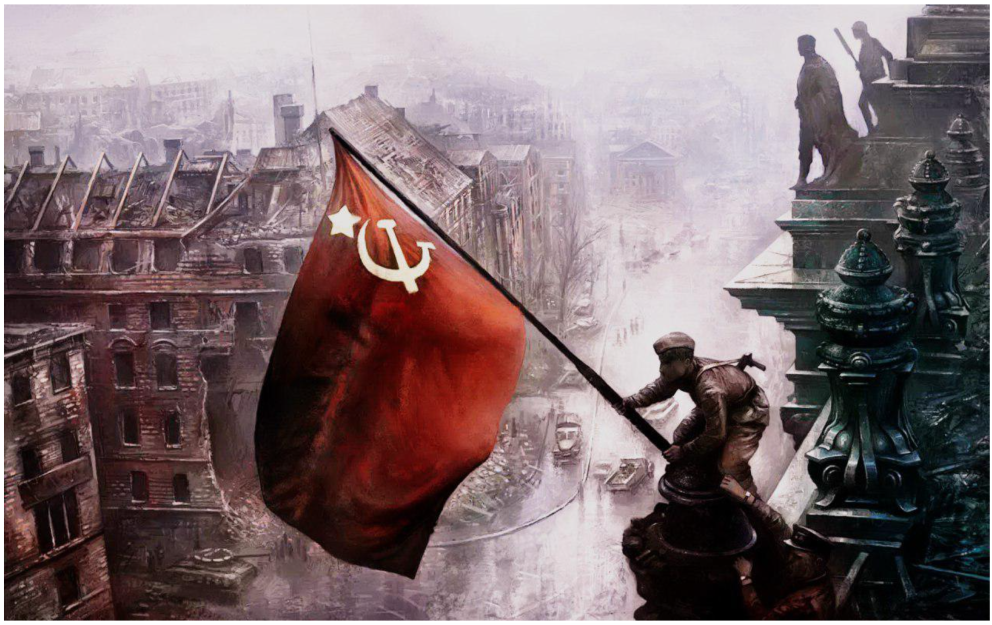
A colored version of the picture taken in Berlin by the network Army photographer Yevgueni Khaldei days before the Nazi's capitulation.
ARTICLE / José Javier Ramírez
average bias. Russia is in theory a democracy, with the current president Vladimir Vladimirovich Putin having been elected through several general elections. His government, nonetheless, has been accused of restricting freedom of opinion. Russia is ranked 149 out of 179 countriesin the Press Freedom Index, so it is no surprise that main Russian average (Pravda, RT, Sputnik News, ITAR-TASS, ...) are strong supporters of the government's version of history. They have been emphasizing on Russia's glorious military history, notoriously since 2015 when they tried to counter international rejection of the Russian invasion of Crimea appealing to the spirit of the 70th World War II anniversary. On the other side, social networks are not often used: Putin lacks a Twitter account, and the Kremlin accounts' posts are not especially significant nor controversial.
Putin's ideology, often called Putinism, involves a domination of the public sphere by former security and military staff, which has led to almost all average pursuing to justify all Russian external aggressions, and presenting Western countries, traditionally opposed to these policies, as hypocritical and Russophobic. Out of the remarkable exceptions to these pro-government public sphere, we might mention Moscow Today newspaper (whose ideology is rather independent, in no way an actual opposition), and the leader of the Communist faction, Gennady Andreyevich Zyuganov, who was labelled Putin several times as a dictator, without too much success among the electorate.
Early period. Russian average take pride in having an enormously long history, to the extent of having claimed that one of its cities, Derbent, played a key role in several civilizations for two thousand years. However, the first millennium of such a long history often goes unmentioned, due to the lack of sources, and even when the role of the Mongolian Golden Horde is often called into question, perhaps in order to avoid recognizing that there was a time where Russians were subjected to foreign domination. In fact, Yuri Petrov, director of RAS Russian History Institute, has refused to accept that the Mongolian conquest was a colonization, arguing that it was a process of mixing with the Slavic and Mongolian elites.
Such arguments do not prevent TASS, Russian state's official average, from having recognized the battle of Kulikovo (1380) as the beginning of Russian state history, since this was the time where all Russian states came together to gain independence. Similarly, Communist leader Zyuganov stated that Russia is to be thanked for having protected Europe from the Golden Horde's invasion. In other words, Russian average have a contradictory position about the nation's beginning: on one hand, they deny having been conquered by the Mongolian, or prefer not to mention such a topic; on the other, they widely celebrate the defeat of the Golden Horde as a symbol of their freedom and power. Similar contradictions are quite common in such an official history, dominated by nationalist bias.
Czarism. Unlike what might be thought, Russian Czars are held in relative high esteem. Orthodox Church has canonized Nicolas II as a martyr for the "patience and resignation" with which he accepted his execution, while public polls carried by TASS argued that most Russians perceive his execution as barbaric and unnecessary. Pravda has even argued that there has been a manipulation of the last Czar's story both by Communists and the West (mutual accusations of manipulation between Russian and Western average are quite common): according to Pyotr Multatuli, a historian interviewed by Pravda, the last Czar was someone with fatherly love towards its citizens, and he just happened to be betrayed by conspirators, who killed him to justify their legitimacy.
But this nostalgic remembrance is not exclusive solely to the last Czar, there are actually multiple complimentary references to several monarchs: Peter the Great was credited by Putin for introducing honesty and justice as the state agencies principles; Catherine the Great for being a pioneer in experimentation with vaccines, and she was even the first monarch to have been vaccinated; Alexander III created a peaceful and strong Russia... Pravda, one of the most pro-monarchy newspapers, has even argued that Czars were actually more responsible and answerable to society than the USA politicians, or that Napoleon's invasion was not actually defeated by General Winter, but by Alexander I's strategy. The appreciation for the former monarchy might be due to the disappointment with the Soviet era, or in some way promoted by Putin, who since the Crimean crisis inaugurated several statues to honor Princes and Czars, without recognizing their tyranny. This can be understood as a way of presenting himself as a national hero, whose decisions must be obeyed even if they are undemocratic.
USSR. The Soviet Union is the most quoted period in the Russian average, both due to their proximity, and because it is often compared to today's government. Perceptions about this period are quite different and to some extent contradictory. Zyuganov, the Communist leader, praises the Soviet government, considering it even more democratic that Putin's government, and has advocated for a re-Stalinisation of Russia. Nonetheless, that is not the vision shared neither by Putin nor by most average.
Generally speaking, Russian average do not support Communist national policy (President Putin himself once took it as "inappropriate" being called neo-Stalinist). There is a recognition of Soviet crimes while, at the same time, they are accepted as something that simply happened, and to what not too much attention should be drawn. Stalin particularly is the most controversial character and a case of "doublethink": President Putin has attended some events to honor Stalin's victims, while at the same time sponsored textbooks that label him as an effective leader. The result, shown in several polls, is that there is a growing indifference towards Stalin's legacy.
However, the approach is quite different when we talk about the USSR foreign policy, which is considered completely positive. The average praise the Russian bravery in defeating Nazi Germany, and doing it almost alone, and for liberating Eastern Europe. This praise has even been shown in the present: Russian anti-Covid vaccine has been given the name of "Sputnik V", subtly linking Soviet former military technology and advancement to the saving of today's world (the name of the first artificial satellite was already used for the news website and broadcaster Sputnik News). Moreover, Putin himself wrote an essay on the World War II where he argued that all European countries had their piece of fault (even Poland, whose occupation he justifies as politically compulsory) and that criticism of Russia's attitude is just a strategy of Western propaganda to avoid accepting its own responsibilities for the war.
This last point is particularly important in Russian average, who constantly criticize Western for portraying Russia and the Soviet Union as villains. According to RT, for instance, Norway should be much more thankful to Russia for its help, or Germany for Russia's promotion of its unification. The reason for this ingratitude is often pointed to the United States and its imperialism, because it has always feared Russia's strength and independence, according to Sputnik, and has tried to destroy it by all means. The accusations to the US vary among the Russian average, from Pravda's accusation of the 1917 Revolution having been sponsored by Wall Street to destabilize Russia, to RT's complaint that the US took advantage of Boris Yeltsin's pro-Western policies to impose severe economic measures that ruined Russian economy and the citizens' well-being (Pravda is particularly virulent towards the West).
What the European neighbors think. As in most countries, politicians in Russia use their national history mostly to magnify the reputation of the nation among the domestic public opinion and among international audiences, frequently emphasizing more the positive aspects than the negative ones. What distinguishes Russian average is the influence the Government has on them, which results in a remarkable history manipulation. Such manipulation has arrived to create some sort of doublethink: some events that glorify Russia (Czars' achievements, Communist military success, etc.) are frequently quoted and mentioned while, at the same time, the dark side of these same events (Czars' tyranny, Stalin's repression, etc.) is ignored or rejected.
Manipulated Russian history is often incompatible with (manipulated or not) Western history, which has led to mutual accusations of hypocrisy and fake news that have severely undermined the relations between Russia and its Western neighbours (particularly Poland, whom Russia insists to blame to some extent for the World War II and to demand gratitude for the liberation provided by Russia). If Russia wants to strengthen its relationships, it must stop idealizing its national history and try to compare it with the Western version, particularly in topics referring to Communism and the 20th century. Only this way might tensions be eased, and there will be a possibility of fostering cooperation.
A separate chapter on this historical reconciliation should be worked with Russia's neighbours in Eastern Europe. Most of them shifted from Nazi occupation to Communist states, and now they are still consolidating its democracies. Eastern Europe societies have mixed feelings of love and rejection towards Russia, what they don't buy any more is the story of the network Army as a force of liberation.
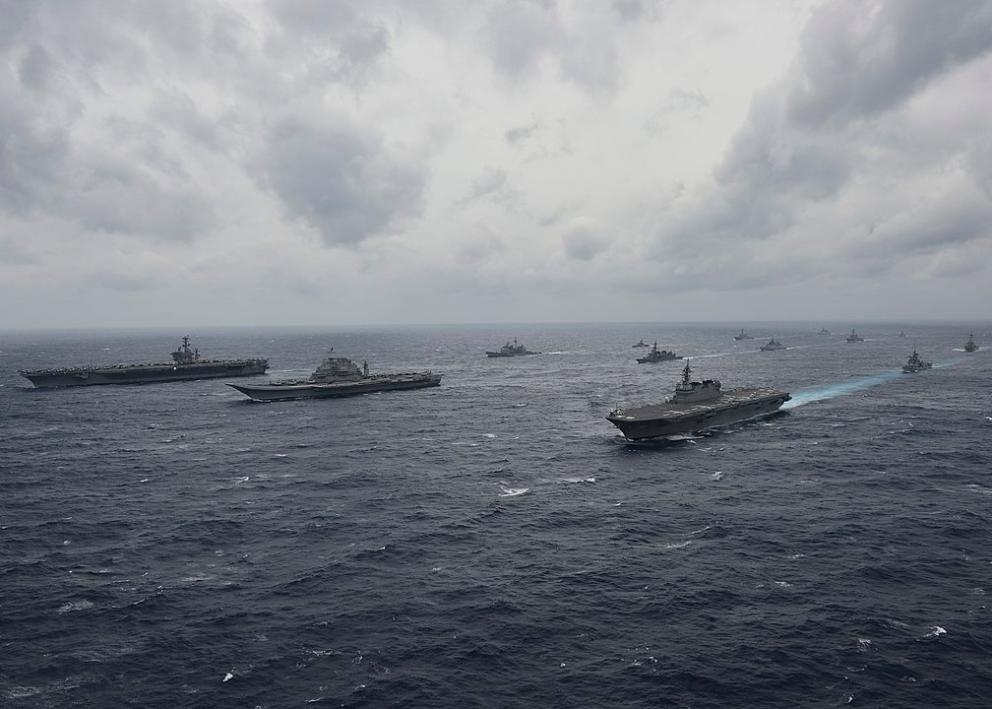
Ships of the US, India and Japan in the Bay of Bengal during exercise Malabar 2017 [US Navy].
JOURNAL / Shahana Thankachan
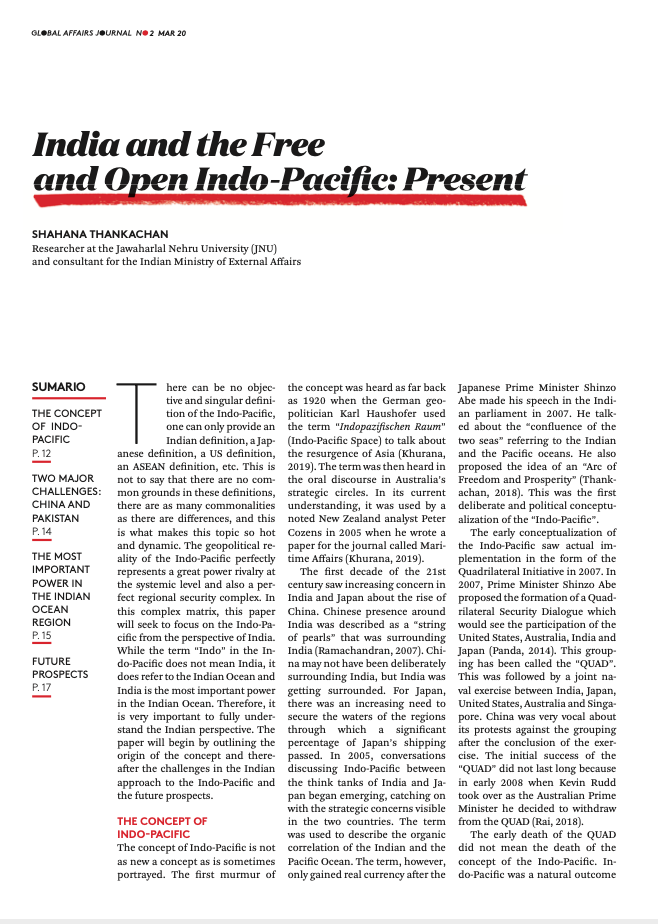 [Document of 6 pages. Download PDF] [Document of 6 pages. Download PDF]
[Document of 6 pages. Download PDF] [Document of 6 pages. Download PDF]
INTRODUCTION
There can be no objective and singular definition of the Indo-Pacific, one can only provide an Indian definition, a Japanese definition, a US definition, an ASEAN definition, etc. This is not to say that there are no common grounds in these definitions, there are as many commonalities as there are differences, and this is what makes this topic so hot and dynamic. The geopolitical reality of the Indo-Pacific perfectly represents a great power rivalry at the systemic level and also a perfect regional security complex. In this complex matrix, this paper will seek to focus on the Indo-Pacific from the perspective of India. While the term "Indo" in the Indo-Pacific does not mean India, it does refer to the Indian Ocean and India is the most important power in the Indian Ocean. Therefore, it is very important to fully understand the Indian perspective. The paper will begin by outlining the origin of the concept and thereafter the challenges in the Indian approach to the Indo-Pacific and the future prospects.
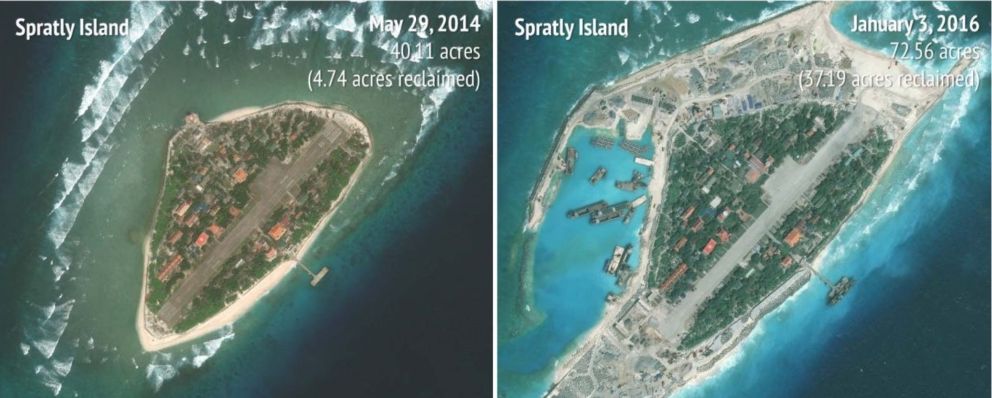
Chinese fortification on small disputed islands [CSIS satellite images].
JOURNAL / Fernando Delage
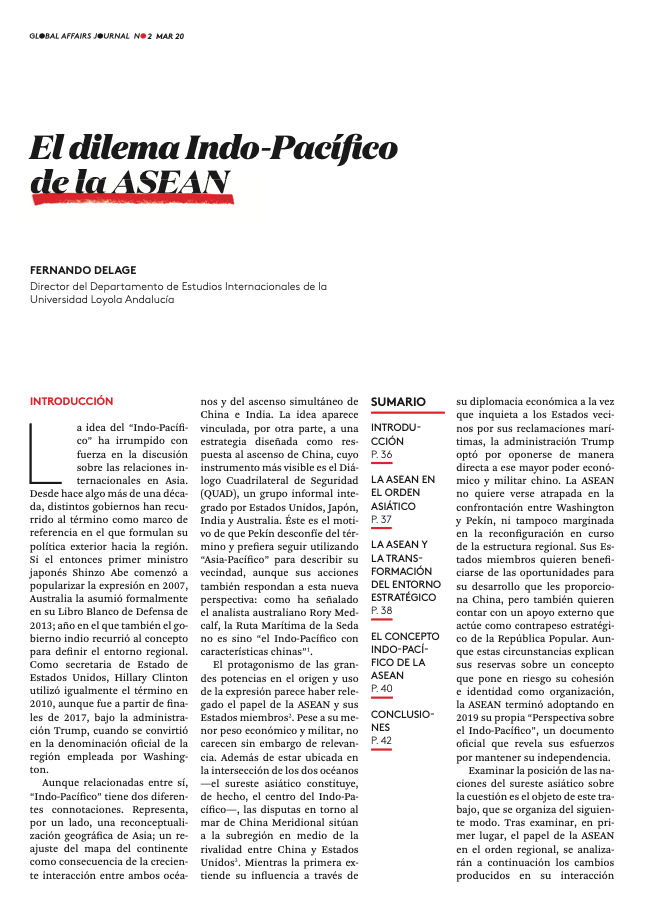 [8-page document. PDF download ].
[8-page document. PDF download ].
INTRODUCTION
The idea of the "Indo-Pacific" has burst into the discussion on international relations in Asia. For a little over a decade now, various governments have been using the term as a framework of reference letter in which to formulate their foreign policy toward the region. If the then Japanese Prime Minister Shinzo Abe began to popularize the expression in 2007, Australia formally took it up in its 2013 Defense White Paper; a year in which the Indian government also resorted to the concept to define the regional environment. As US administrative assistant of State, Hillary Clinton similarly used the term in 2010, although it was as of late 2017, under the Trump administration, that it became the official designation of the region employed by Washington.
Although related, "Indo-Pacific" has two different connotations. It represents, on the one hand, a geographical reconceptualization of Asia; a readjustment of the map of the continent as a consequence of the growing interaction between the two oceans and the simultaneous rise of China and India. The idea is linked, on the other hand, to a strategy designed as a response to China's rise, whose most visible instrument is the Quadrilateral Security Dialogue (QUAD), an informal group made up of the United States, Japan, India and Australia. This is why Beijing is wary of the term and prefers to continue to use "Asia-Pacific" to describe its neighborhood, even if its actions also respond to this new perspective: as the Australian analyst Rory Medcalf has pointed out, the Maritime Silk Road is nothing more than "the Indo-Pacific with Chinese characteristics".
The prominence of the major powers in the origin and use of the expression seems to have relegated the role of ASEAN and its member states. Despite their lesser economic and military weight, they are nevertheless not without relevance. In addition to being located at the intersection of the two oceans - Southeast Asia is, in fact, the center of the Indo-Pacific - disputes over the South China Sea place the subregion in the midst of the rivalry between China and the United States. While the former extends its influence through its economic diplomacy while unsettling neighboring states over their maritime claims, the Trump administration chose to directly oppose this increased Chinese economic and military power. ASEAN does not want to be caught up in the confrontation between Washington and Beijing, nor does it want to be marginalized in the ongoing reconfiguration of the regional structure. Its member states want to benefit from the opportunities for development provided by China, but they also want external support to act as a strategic counterweight to the People's Republic. Although these circumstances explain its reservations about a concept that puts its cohesion and identity as an organization at risk, ASEAN ended up adopting its own "Indo-Pacific Perspective" in 2019, an official document that reveals its efforts to maintain its independence.
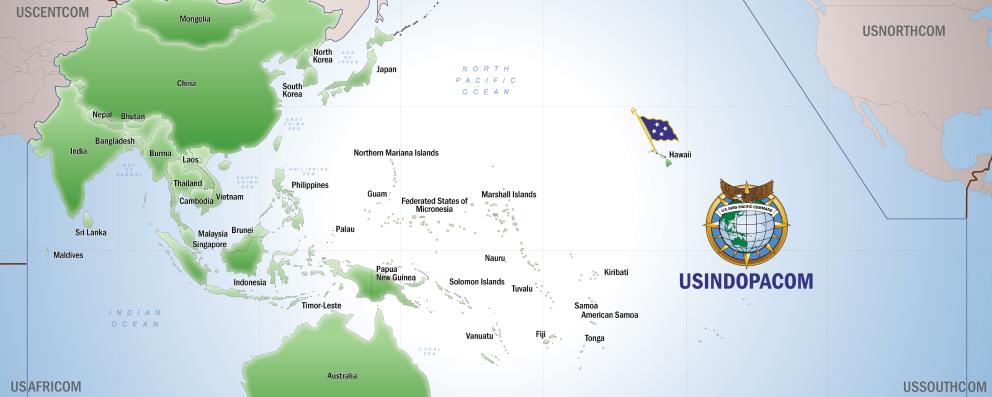
Map of the skill area of the U.S. Pentagon's Indo-Pacific Command [USINDOPACOM].
JOURNAL / Juan Luis López Aranguren
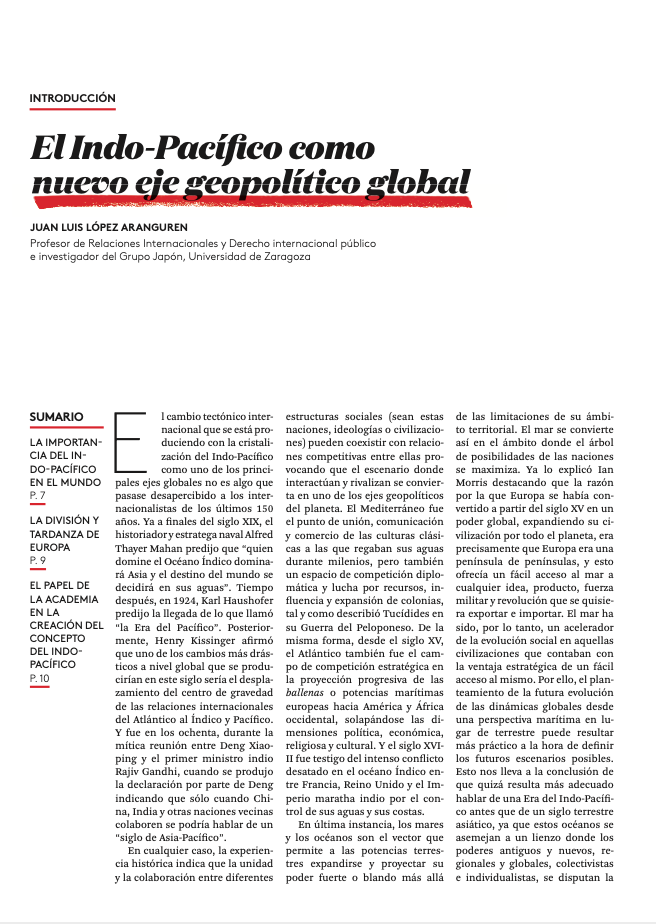 [6-page document. PDF download ].
[6-page document. PDF download ].
INTRODUCTION
The international tectonic shift that is taking place with the crystallization of the Indo-Pacific as a major global axis is not lost on the internationalists of the last 150 years. Already at the end of the 19th century, the naval historian and strategist Alfred Thayer Mahan predicted that "whoever dominates the Indian Ocean will dominate Asia and the fate of the world will be decided in its waters". Some time later, in 1924, Karl Haushofer predicted the coming of what he called "the Pacific Age." Later, Henry Kissinger asserted that one of the most dramatic global changes to occur in this century would be the shift of the center of gravity of international relations from the Atlantic to the Indian and Pacific Oceans. And it was in the 1980s, during the legendary meeting between Deng Xiaoping and Indian Prime Minister Rajiv Gandhi, that Deng declared that only when China, India and other neighboring nations cooperated could we speak of an "Asia-Pacific century".
In any case, historical experience indicates that unity and partnership between different social Structures (be they nations, ideologies or civilizations) can coexist with competitive relations between them, causing the scenario where they interact and compete to become one of the geopolitical axes of the planet. The Mediterranean was the point of union, communication and trade of the classical cultures to which its waters irrigated for millennia, but also a space of diplomatic competition and struggle for resources, influence and expansion of colonies, as described by Thucydides in his Peloponnesian War. Similarly, since the 15th century, the Atlantic was also the field of strategic competition in the progressive projection of the European whales or maritime powers towards America and West Africa, overlapping the political, economic, religious and cultural dimensions. And the 18th century witnessed the intense conflict in the Indian Ocean between France, the United Kingdom and the Indian Maratha Empire for the control of its waters and coasts.
In the last written request, the seas and oceans are the vector that allows terrestrial powers to expand and project their strong or soft power beyond the limitations of their territorial scope. The sea thus becomes the realm where the tree of possibilities of nations is maximized. Ian Morris already explained this by pointing out that the reason why Europe had become a global power from the 15th century onwards, expanding its civilization all over the planet, was precisely that Europe was a peninsula of peninsulas, and this offered easy access to the sea for any idea, product, military force and revolution to be exported and imported. The sea has been, therefore, an accelerator of social evolution in those civilizations that had the strategic advantage of easy access to it. Therefore, approaching the future evolution of global dynamics from a maritime rather than a terrestrial perspective may be more practical in defining possible future scenarios. This leads us to the conclusion that it is perhaps more appropriate to speak of an Indo-Pacific Era rather than an Asian land century, as these oceans resemble a canvas where old and new, regional and global, collectivist and individualist, powers vie for the projection of their interests, spheres of influence and identities to global reach.
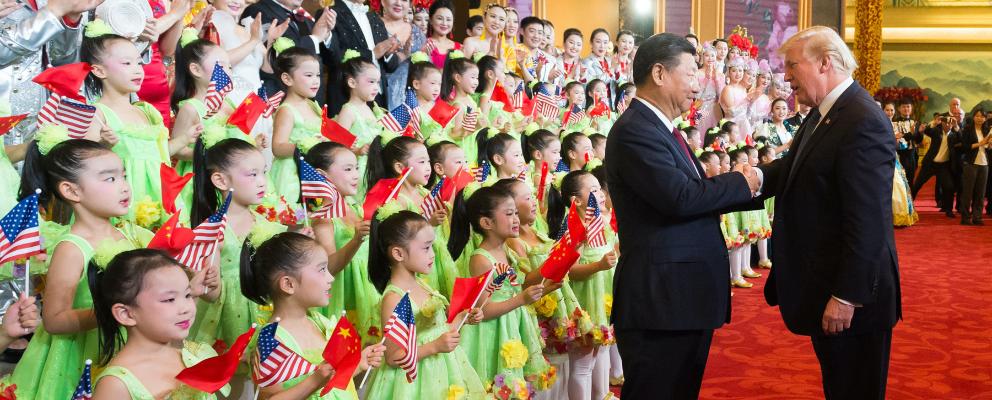
Xi and Trump during the U.S. president's only visit to China, in 2017 [White House].
JOURNAL / Florentino Portero
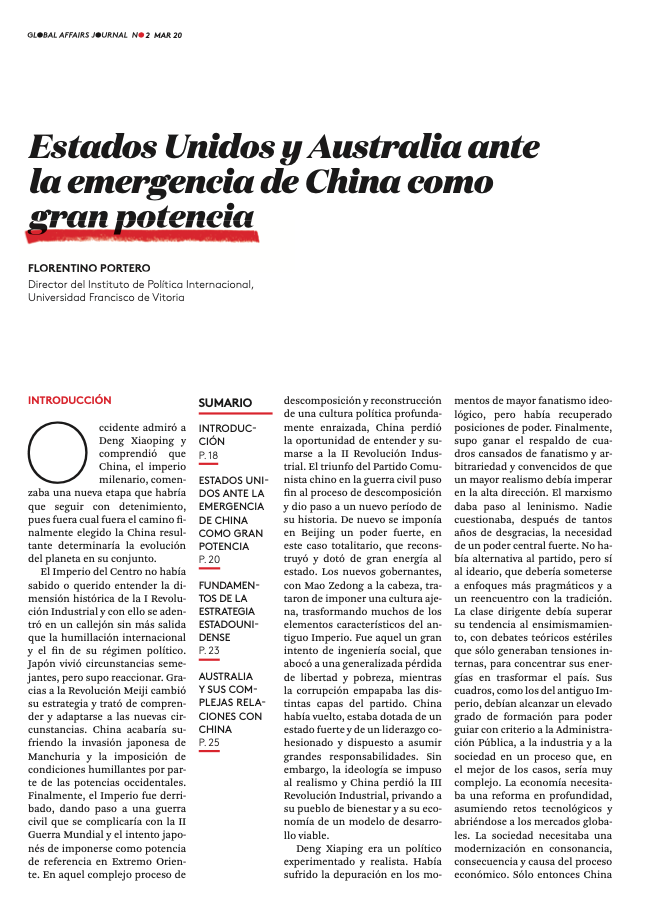 [10-page document. download in PDF] [10-page document. download in PDF].
[10-page document. download in PDF] [10-page document. download in PDF].
INTRODUCTION
The West admired Deng Xiaoping and understood that China, the millenary empire, was entering a new stage that would have to be carefully followed, for whatever path was finally chosen, the resulting China would determine the evolution of the planet as a whole.
The Central Empire had not known or wanted to understand the historical dimension of the First Industrial Revolution and thus entered an impasse with no other way out than international humiliation and the end of its political regime. Japan experienced similar circumstances, but was able to react. Thanks to the Meiji Revolution, it changed its strategy and tried to understand and adapt to the new circumstances. China would end up suffering the Japanese invasion of Manchuria and the imposition of humiliating conditions by the Western powers. Finally, the Empire was overthrown, giving way to a civil war that would be complicated by World War II and the Japanese attempt to impose itself as a reference letter power in the Far East. In that complex process of decomposition and reconstruction of a deeply rooted political culture, China lost the opportunity to understand and join the Second Industrial Revolution.
The victory of the Chinese Communist Party in the civil war put an end to the process of decomposition and ushered in a new period in its history. Once again a strong power, in this case a totalitarian one, was imposed in Beijing, which rebuilt and endowed the state with great energy. The new rulers, with Mao Zedong at their head, tried to impose an alien culture, transforming many of the characteristic elements of the old Empire. It was a great attempt at social engineering, which led to a widespread loss of freedom and poverty, while corruption permeated the various layers of the party. China was back, endowed with a strong state and a cohesive leadership willing to assume great responsibilities. However, ideology won out over realism and China lost the Third Industrial Revolution, depriving its people of welfare and its Economics of a viable development model .
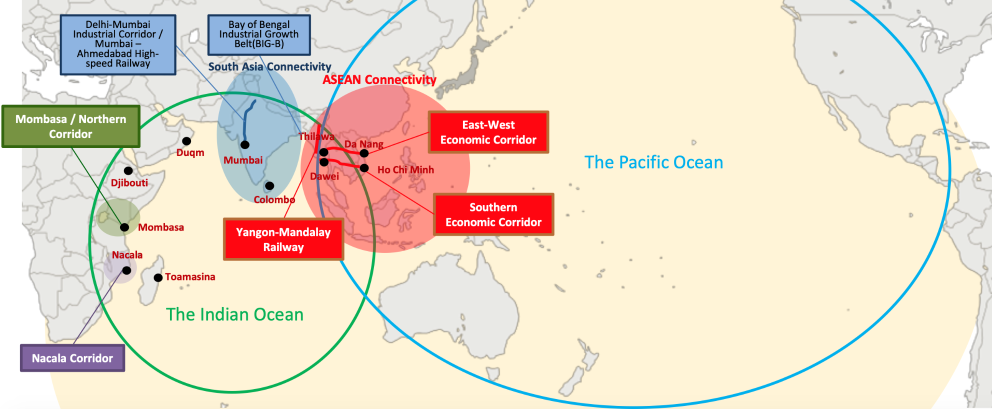
Map of the Japanese vision of the Free and Open Pacific [MoFA].
JOURNAL / Carmen Tirado Robles
 [8-page document. PDF download ].
[8-page document. PDF download ].
INTRODUCTION
The Free and Open Indo-Pacific (FOIP) concept is said to date back to the article by Indian naval officer Captain Gurpreet Khurana, who first wrote about this geopolitical concept in early 2007, in a graduate paper "Security of Sea Lines: Prospects for India-Japan Cooperation". At that time, the free and open Indo-Pacific was primarily a geographical concept describing the maritime space stretching from the East African and West Asian littorals, across the Indian Ocean and the western Pacific Ocean to the East Asian coasts. At the same time, Japanese Prime Minister Shinzo Abe presented his foreign policy plan based on democratic values from which he proposed "I will engage in strategic dialogues at the leader's level with countries that share fundamental values such as Australia and India, with a view to widening the circle of free societies in Asia as well as in the world", which together with the consolidation of relations with the United States ("The times demanded that Japan shift to proactive diplomacy based on new thinking. I will demonstrate the 'Japan-U.S. Alliance for Asia and the World' even further, and to promote diplomacy that will actively contribute to stalwart solidarity in Asia"), creates the concept of Quadrilateral or Quad, as opposed to a Sino-centric view of Asia.
The idea of the Quad joins the FOIP when Abe, in August 2007, in his speech to the Indian Parliament, based on the "Confluence of the Indian and Pacific Oceans" and "dynamic coupling as seas of freedom and prosperity" of Asia's largest geographical region and later, already in his second term, presented at the VI Tokyo lecture on African development , which took place in Nairobi (Kenya) on August 27, 2016 (TICAD VI), the new geopolitical framework of the Indo-Pacific.
[Alyssa Ayres, Our Time Has Come. How India Is Making Its Place in the World (Oxford University Press: Oxford, 2020) 360 pgs].
review / Alejandro Puigrefagut
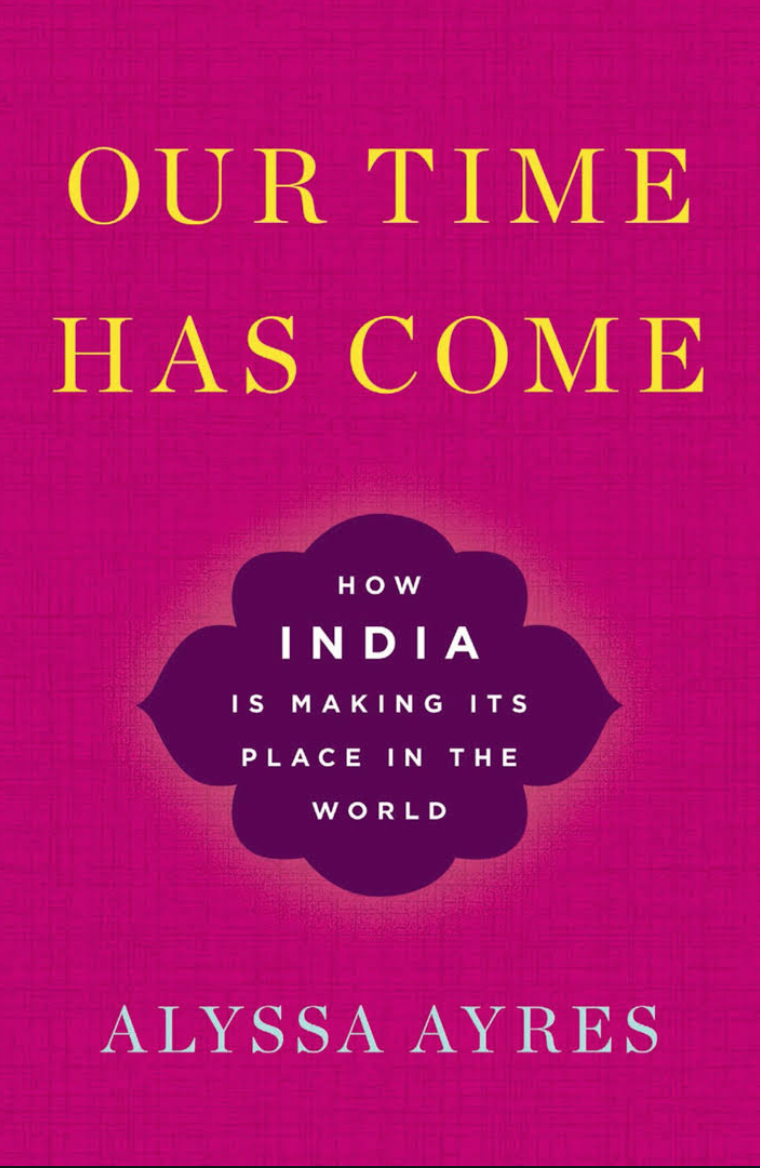
A progressively rising India wants to occupy a prominent place among the global powers. In recent decades, discussions about India's global rise and place in the world have been on the rise, sometimes in a context of possible alliances to counter China's excessive dominance.
Alyssa Ayres, an expert on India, Pakistan and South Asia at the U.S. Council on Foreign Relations, reflects well, through her book Our Time Has Come. How India Is Making Its Place in the World, the role played by this democracy at the international level, the obstacles it continues to face and the implications of its rise for the United States and other countries in the Indo-Pacific region, such as Pakistan and China. It is fair to say that India's economic expansion has placed it among the world's leading emerging powers, but now it wants to move forward and gain a place among the global powers.
For a full understanding of India's global role, the author analyzes its internal political, economic and social realities. India is the world's largest democracy, thus encompassing a wide range of national and regional parties advocating radically disparate policies. This creates complications in reaching agreements that benefit a large part of the population. In addition, other factors that complicate the relationship between the population are social division and religion. To begin with, India has a serious problem of social division caused by the distinction between social classes, or castes, some of which continue to have an important weight in decision making. Likewise, the religious question takes on a prominent role due to the large number of religions that coexist in the Indian territory; however, the Hindu and Muslim majority are the ones that mark the political diary .
Ayres highlights two characteristics that shape India's position in the world today: India's own perception of itself as a development country and its abstention from global entanglements. According to the author, despite India's emergence as one of the world's largest economies, it continues to have a domestic perception of itself as a country doomed to always be among the development nations. As a result, domestic economic policies slow down and hinder international ambitions and are thus in continuous conflict. On the other hand, India has historically stayed out of major global issues and international blocs with its policy of non-alignment.
Our Times Has Come, while defending India's high position in the international system, also highlights the major challenges India faces for not having abandoned its old policies. Firstly, Economics is still certainly protectionist and there is no clear consensus on the new inputs that a more open market Economics could bring. Second, India continues to struggle with the bequest of its non-alignment foreign policy and remains ambivalent about how it should exercise its power in multilateral institutions. And third, India remains overly protective of its autonomy, and thus seeks to shape its international interactions on Indian terms. Hence, India tends to move cautiously and deliberately in the international sphere.
On the other hand, the book emphasizes the relationship between India and the United States. The interaction between the two countries differs from their relations with other states because New Delhi, while seeking a closer strategic and economic relationship with the US, does not want to be subject to the obligations inherent in this alliance, but rather to acquire authority without having to bow to Washington.
Ayres emphasizes the need to reform global governance to create a specific space for New Delhi. His recommendations include support for India's membership in the UN Security committee and other institutions that establish the global economic and security diary . It is clear that India, as a rising power, should be better understood and appreciated on its own terms. In other words, New Delhi should acquire a more pivotal role in the international arena and take some leadership to avoid being squeezed by its direct competitors at the regional and global level.
The pages of Our Times Has Come provide several years of first-hand knowledge and study of India's foreign policy, showing its complexities and the major characteristics that shape it. Scholar Alyssa Ayres, through this book, offers us an essential analysis to understand what India is, but, above all, what it wants to become.
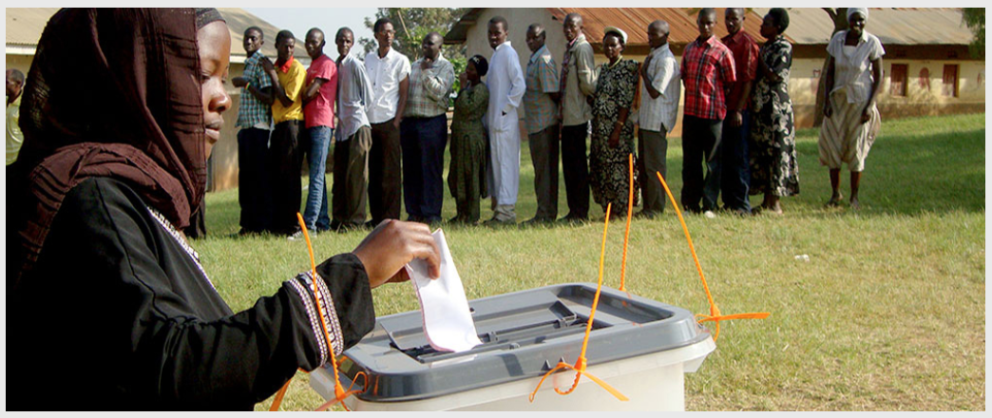
COMMENTARY / Norman Sempijja
February 1st, 2021
When President Yoweri Museveni came to power in 1986, he oversaw a reset of Ugandan politics for the next 35 years. He outlawed parties and formed a movement system which although has sometimes been described as a one-party state was crucial in bringing all groups on board to chart the way forward for a country that had been ravaged by misrule and conflict for almost 20 years.
Fast forward 2021, we are faced with a slightly different situation but of likely grave consequences. Uganda is in the middle of a stand-off between President Museveni and his challenger Mr Robert Kyagulanyi (also known as Bobi Wine). The issue relates to the outcome of the 2021 presidential election which although was held in a very peaceful manner had gross vote-counting irregularities. The Uganda electoral commission gave Museveni 58.6% and Kyagulanyi 34.8%. On the other hand, the tallying centres set up by Kyagulanyi's team using the Uvote app where declaration forms were uploaded once counting was done have so far given Kyagulanyi 71% and Museveni around 25% of the vote. Vote counting is still ongoing. With Kyagulanyi unlikely to concede Museveni decided to put him under house arrest to prevent him from leading mass protests. The internet was also switched off for 5 days and at the moment social average can only be accessed through the use of VPN services.
Amid this melee is Covid-19 virus rampaging through the country. The health services are still not fully prepared to deal with a massive outbreak and although the lockdown has been eased, the economic impact will be felt for years. For a country that is largely agro-based and relies heavily on the informal sector, the impact has been dire on the already struggling population. Secondly, a worrying trend has emerged internationally where various variants of the Covid virus have been registered. For example, we have new covid-19 strains in the United Kingdom, South Africa, Brazil and Japan for now. Thus, questions have lingered about the effectiveness of the current vaccines in circulation to combat these new variants. But that is beside the point. Uganda has not secured any of the vaccines yet.
Therefore, Museveni as head of state faces a difficult situation. Does he pour the meagre resources at his disposal to contain Kyagulanyi? Or does he negotiate with him to chart a way forward out of this debilitating situation? Obviously, in trying to answer these questions he will have to weigh the cost-benefits to the solutions and gauge if they fit in his diary.
So, let us imagine Museveni throws all his resources at containing Kyagulanyi. Well, he will have to curtail social average especially as it was crucial to ending former Egyptian president Hosni Mubarak. It is that powerful. But we should note that the internet is hard to police and is a medium through which a lot of people make a living. Either way patience will run out for the people whose livelihoods will be curtailed in the process. They will have no option but to organize protests. The bad news for Museveni is that according to African Union brief on the Sahel 2020 it is clear that violent clashes and violence against civilians are on the rise during these covid-19 times. If we mirror that with the November riots in Uganda, we are likely to see more protests if the heavy-handed policies of the state are continuously applied.
Museveni will also have to maintain Kyagulanyi under house arrest, but he will further draw the ire of the international community as his current gambit on the elections was a stretch too far. He may have burnt up his remaining currency with several international stakeholders. Apart from Western societies, citizens in different African countries have grown tired of Museveni and are pressuring their countries not to acknowledge his electoral win. This exasperation is among the young people especially in Kenya, Malawi, Nigeria and South Africa to mention but a few.
A combination of continental and international loss of support could set Uganda the same path as Zimbabwe under Mugabe if Museveni resorts to outright violence. We could see sanctions being applied on top of the travel restrictions already imposed on key players within Museveni's government. The problem for Museveni is Uganda does not possess strong support in East Africa as Mugabe did in Southern Africa. Plus, Museveni's relationship with President Kagame has been frosty, to say the least. Either way, he will have to deal with mass protests in support of freedom for Kyagulanyi in Uganda. This will call for further investment in the police and army to contain the situation. Let us not forget that with the fluid nature of Covid-19 pandemic, the country could face deep human security issues. Hence containing Kyagulanyi will come at a very political and economic cost both to Museveni and Uganda.
What if Museveni decided to negotiate with Kyagulanyi and form a government of national unity? This wouldn't be without precedent as Museveni set into place the movement system discussed earlier that brought everyone on board and for 10 years the country benefited from collective governance (except the north which was experiencing an insurgency). I'm of the persuasion that Uganda is again on similar footing. Institutions have been degraded and cannot perform independently. There is a lot of frustration with the current regime as exemplified by the parliamentary elections where the vice president and 24 ministers lost their seats. By inviting Kyagulanyi onboard Museveni will be pressing the reset button especially as he will inject young people into the system, and they could play a key role in reducing corruption and improving service delivery.
It would cost Museveni some political capital among the entrenched supporters, but it will save his legacy. He will be seen as a father of a nation mentoring young leaders to take over from him. Right now, he is seen as an insensitive, power-hungry despot. But that could change in an instant if he goes for a coalition with Kyagulanyi and other leaders like Mugisha Muntu, Nobert Mao and Patrick Amuriat. The resources that would have been spent on containing them would be allocated to the heavily challenged health care system to combat Covid-19 and other ailments.
Moreover, this will save the National Resistance Movement political party from oblivion once Museveni goes. The reason for this is the party has struggled to attract a strong intellectual and ideological talent within its ranks as it has been accused of nepotism. This would be a good time to reset the party and its structures and prepare for the transition from Museveni. By co-opting the opposition into government this will put them under scrutiny and any blunders they make will further give NRM a softer landing come 2026.
The benefit for Kyagulanyi would be experience in government. Although he was a member of parliament, gaining further experience in public governance would do him a lot of good and also build a strong support base within the country. Since his political party has the largest number of opposition members of parliament this will give him further credibility and foundation to strengthen his National Unity platform party (NUP). The same will apply for the Alliance for National Transformation (ANT) led by Mugisha Muntu. The other parties like Forum for Democratic Change (led by Patrick Amuriat) and Democratic Party (led by Nobert Mao) will get a new lease of life.
Therefore, due to the circumstances afoot, it would be of immense political worth to form a government of national unity under the leadership of President Yoweri Museveni but with considerable influence of the other parties especially the National Unity Platform, Alliance for National Transformation, Democratic Party and Forum for democratic Change. This will pause the political animosity as the country goes into reforms to ensure more transparent electoral and governance processes.
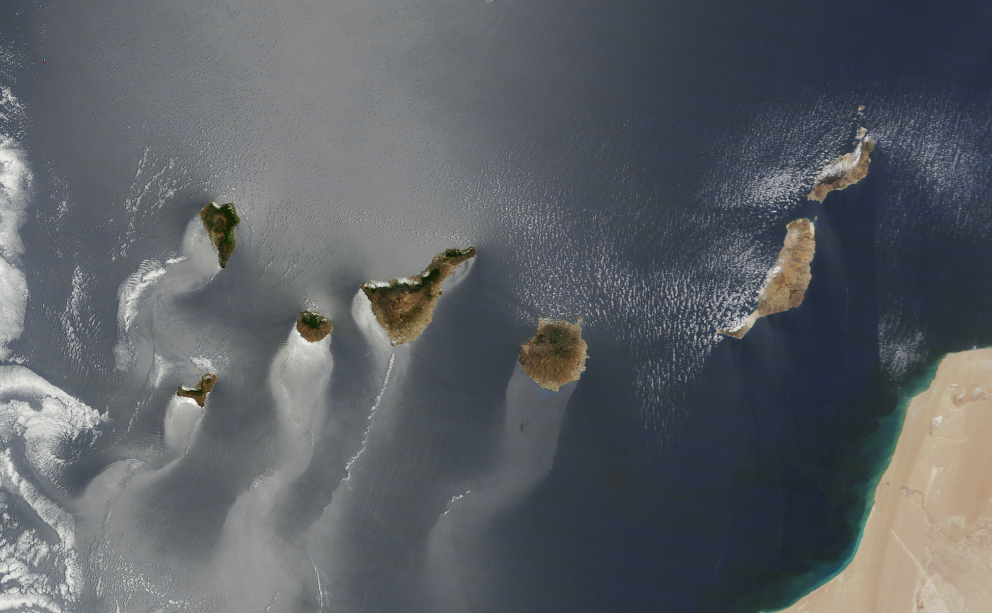
Satellite image of the Canary Islands [NASA].
COMMENTARY / Natalia Reyna Sarmiento
The global pandemic caused by Covid-19 has forced the application of quarantines and other restrictions in all parts of the world and this has greatly limited the movement of people from one country to another. Nevertheless, the migratory phenomenon has continued its course, also in the case of Europe, where the closure of borders during part of 2020 has not prevented illegal immigration, such as from sub-Saharan Africa. In fact, in this time of pandemic, the health misery of poor countries has added another reason for flight from the countries of origin.
The increase in migration in recent decades has been a consequence of various humanitarian challenges. Lack of security, fear of persecution, violence, conflicts and poverty, among other reasons, generate a status of vulnerability that in many cases pushes those who suffer from these circumstances to leave their country in search of better conditions. The emergence of Covid-19 has been another element of vulnerability in societies with scarce medical resources in the last year as well, while the arrival of migrants without knowing whether or not they were carriers of the virus has aggravated social resistance to immigration in developed economies. Both issues went hand in hand especially in the migratory crisis experienced by the Canary Islands throughout 2020, especially in the last few months.
Fourteen years after the "cayuco crisis", the archipelago experienced another B in the arrival of immigrants (this time the term that has become generalized for their boats is pateras). In 2020, more than 23,000 immigrants arrived in the Canary Islands, in crossings that at least claimed the lives of nearly 600 people. If in 2019 about a hundred boats with illegal immigrants arrived to the islands, in 2020 there were more than 550, which speaks of a migratory phenomenon multiplied by five.
Why did this increase occur, redirecting to the Canary Islands a flow that at other times has sought the Mediterranean route? On the one hand, the sea crossing to reach Europe still prevails, because in addition to the cost of airfare -prohibitive for many-, the flights require documentation that often is not possessed or that facilitates a control by the authorities -departure and arrival- that you want to avoid. On the other hand, the difficulties in points of the Mediterranean route, such as stricter policies in the admission of refugees rescued from the sea imposed by Italy or the status of war that Libya lives, where itineraries arrive from Sudan, Nigeria and Chad, for example, derived part of the pressure of the migratory mafias towards the Canary Islands. Morocco's attitude may also have played a role in this.
Spain has an interest in maintaining a good relationship with Morocco for obvious reasons. Its border with Ceuta and Melilla and its proximity to the Canary Islands make it a neighbor that can contribute both to security and to intensifying migratory pressure on Spanish territory. Precisely at a critical moment in the Canary Islands crisis, the Spanish Minister of the Interior, Fernando Grande-Marlaska, went to the neighboring country on November 20 to meet with his Moroccan counterpart, Abdelouafi Laftit, with the intention of requesting financial aid from the Alaouite monarchy to put a stop to the migratory crisis. However, although in the following days a decrease of arrivals of small boats to the Canary Islands was registered, soon the arrivals were increasing again, leaving effectiveness of the visit made by Marlaska.
On the other hand, in those weeks, Pablo Iglesias, vice-president of the Spanish government and University Secretary of Podemos, called on Morocco to hold a referendum on the future of Western Sahara, a former Spanish colony under Moroccan tutelage admitted by the UN until the holding of an enquiry for the Saharawi people. The admission in the same days of Morocco's sovereignty over Western Sahara by the Trump Administration (in exchange for the establishment of diplomatic relations between Morocco and Israel) led Rabat to expect a revision of the Spanish position, which is aligned with the UN approach. The ratification of this by Iglesias and above all his tone of demand made the Moroccan monarch, Mohamed VI, decide not to receive the President of the Spanish Government, Pedro Sanchez, on a trip to the neighboring country. Other issues, such as the delimitation of territorial waters made by Morocco in January, expanding its exclusive economic zone, have increased the disagreements between the two countries.
In addition to the normal tension in the Canary Islands due to the arrival of thousands of immigrants in a short time, there were also the health risks due to the pandemic. Beyond the fears spread by some about the possible entrance of people actually infected with the coronavirus, the established protocols obliged to keep isolated those arriving in small boats, which caused a problem of overcrowding in facilities that were not initially adequate.
The Spanish Red Cross created areas reserved for the isolation of people who tested positive for Covid-19. In addition, temporary macro-camps were set up to rehouse thousands of migrants who were first housed in different hotels. The transfer of groups of them by plane to points on the Peninsula created controversy that the government had to deal with. The entrance of 2021 has, at least momentarily, lowered the pressure.
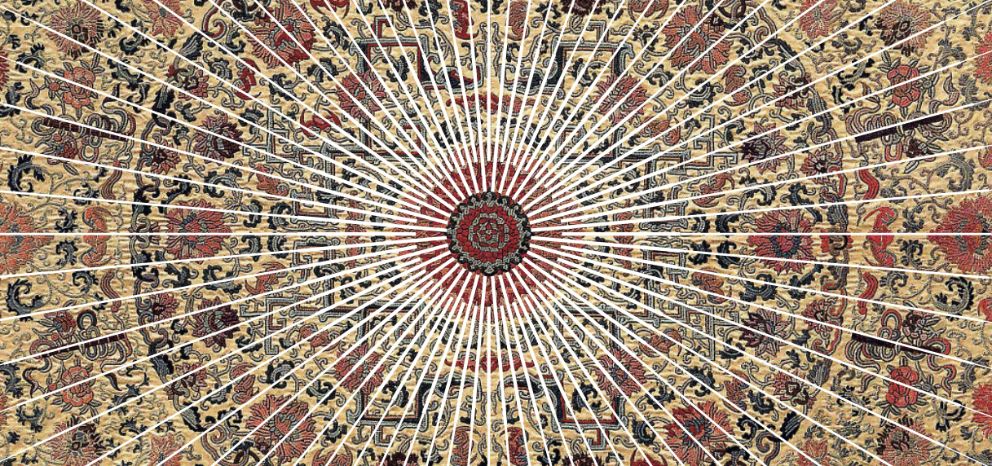
GLOBAL AFFAIRS JOURNAL #3 / January 2021
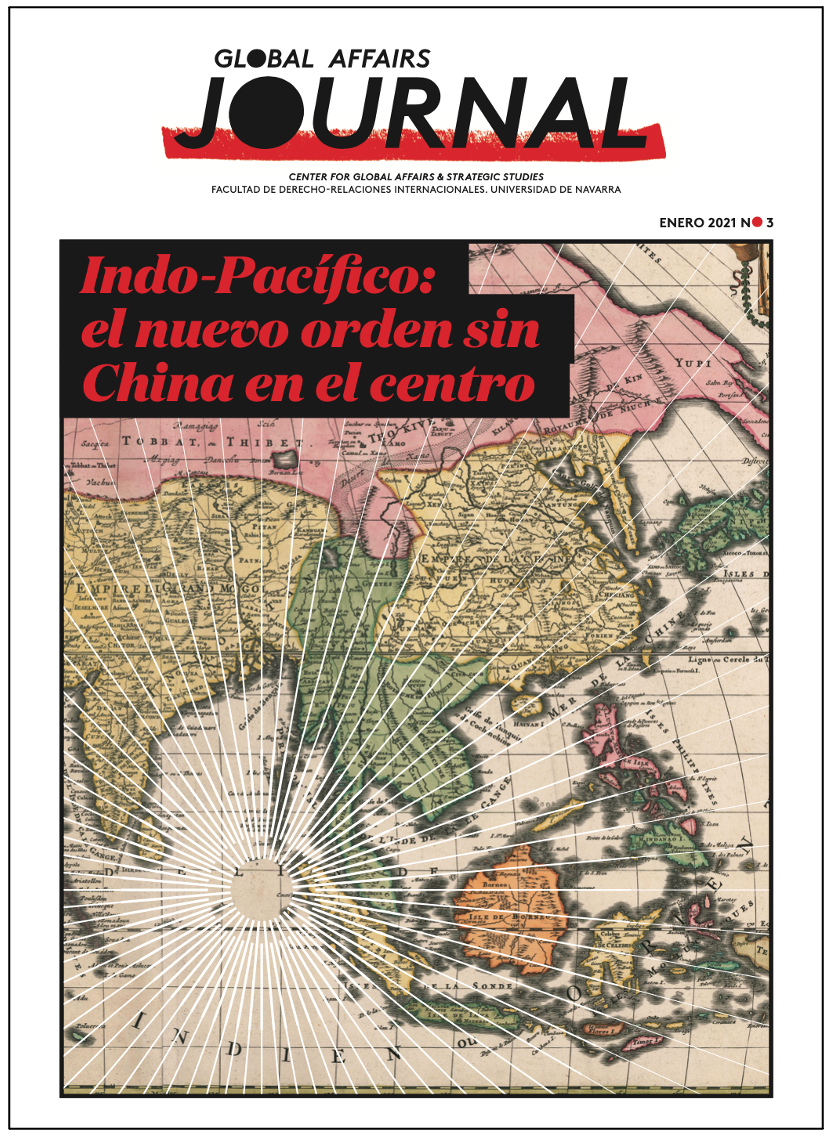 download the PDF of the complete Journal ]download the PDF of the complete Journal ].
download the PDF of the complete Journal ]download the PDF of the complete Journal ].
The globe rotates a few Degrees further to the West.
PRESENTATION
There was a time when the world's strategic axis was in Europe. With the incorporation of the New World into the global order, the axis shifted for a long time to the Atlantic, between Europe and America. The consolidation of the primacy of the United States made it the pivot of the world. With the development of the Asian tigers, the specific weight of the planet shifted to the Pacific, between America and Asia. Later, the initial concept of Asia-Pacific gradually lost the sense of space between two coasts to eventually refer only to the shore where China is located, as it has grown as a superpower and has become the focus of general attention. We are now witnessing another progression in the rotation of the globe, again a few Degrees further to the West. Asia-Pacific gives way to the idea of Indo-Pacific by bringing India into the equation. And it is possible that, in the future, as Eurasia becomes more compact and Africa participates more in international decisions, the way to look at the world map will be to have the Indian Ocean in the middle, as a global Mediterranean.
Today, in any case, we are witnessing a new Indo-Pacific moment. It is a new world order in which China no longer occupies the center where it aspired to settle: the ground has begun to move before it can fully settle. Beijing's own strategic haste has triggered the mobilization of the Asian environment, which is partly supported by India which, by demographic Issue and economic potential, can serve as a lever to counterbalance China's continental counterweight. Global Affairs Journal addresses in this issue the articulation of this counterweight, which revolves around the initiatives of a Free and Open Indo-Pacific and the so-called Quad, whose vertexes are Japan, India, Australia and the United States, with implications also for ASEAN.
Index
THE INDO-PACIFIC AS A NEW GLOBAL GEOPOLITICAL AXIS
Juan Luis López Aranguren [Introduction].
Professor of International Relations, University of Zaragoza
p. 6-11 [PDF version].
PRESENT COMPLEXITIES AND FUTURE PROSPECTS
Shahana Thankachan
Researcher at the Jawaharlal Nehru University, India
p. 12-17 [PDF version].
UNITED STATES AND AUSTRALIA BEFORE
THE EMERGENCE OF CHINA AS A GREAT POWER
Florentino Portero
Director of the Institute of International Politics, Francisco de Vitoria University.
p. 18-27 [PDF version].
FREE AND OPEN INDO-PACIFIC: A JAPANESE INITIATIVE
OF FOREIGN POLICY FOR GLOBAL COOPERATION
Carmen Tirado Robles
Coordinator of the Japan research group , University of Zaragoza.
p. 28-35 [PDF version].
THE ASEAN'S INDO-PACIFIC DILEMMA
Fernando Delage
Director of the Dept. programs of study International programs of study , Universidad Loyola Andalucía
p. 36-43 [PDF version].
RECOMMENDED READINGS
J. L. López Aranguren, S. Sánchez Tapia
E. J. Blasco, A. Puigrefagut
p. 44-46 [PDF version].
Showing 61 to 70 of 426 entries.
